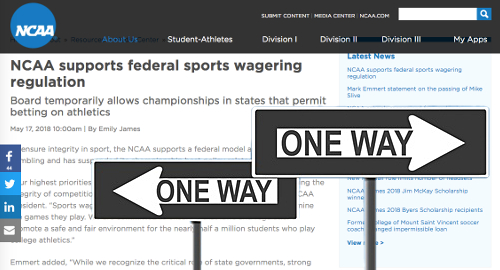 The US body overseeing college athletics has flip-flopped on its policy of not holding championship games in states that permit legal sports betting.
The US body overseeing college athletics has flip-flopped on its policy of not holding championship games in states that permit legal sports betting.
On Thursday, the National Collegiate Athletics Association (NCAA) issued a statement saying that, in response to the US Supreme Court striking down the federal sports betting prohibition, the NCAA’s board of directors had decided to “temporarily” suspend its “championship host policy related to sports wagering.”
The NCAA had previously used its championship host policy as a cudgel with which to threaten states like New Jersey into abandoning their pursuit of legal wagering. The NCAA argued at the time that the threat was justified in order to defend “the integrity of sports and student-athlete well-being” from the alleged scourge of legal wagering.
But that was then, this is now. The NCAA now claims that it supports “a federal model addressing legalized gambling.” NCAA president Mark Emmert acknowledged “the critical role of state governments” in the whole democracy thing, but “strong federal standards are necessary to safeguard the integrity of college sports and the athletes who play these games at all levels.”
Sen. Orrin Hatch (R-UT) announced Monday that he would introduce legislation that would “establish fundamental standards” for wagering “to help protect honesty and principles in the athletic arena.”
However, it’s anyone’s guess whether this legislation will (a) be approved, or (b) be approved before too many states join New Jersey in offering state-level wagering, thereby changing the facts on the ground too much for Congressional Republicans to see the merits in messing with the Court’s affirmation of states’ rights.
Most of the four pro sports leagues that joined the NCAA in fighting New Jersey’s legal betting quest for the last seven years have also come out in favor of new federal betting regulations, which they view as the best vehicle for achieving their goals of reaping an ‘integrity fee’ from sports wagering turnover and forcing betting operators to pay to use league-supplied data for wagering purposes.
The NCAA cautioned that its begrudgingly pro-betting stance had no effect on rules barring its ‘student-athletes’, coaches and other athletic staffers from wagering on sports. However, the NCAA said its membership “may reconsider appropriate consequences for those who legally bet on sports.”
The NCAA is also, for the moment, maintaining its restrictions on accepting gambling sponsorships and advertising for its championship matches and Football Bowl Subdivision post-season bowl games. At least, until the federal government can bring some badly needed structure to the chaos that is the advertising industry.





